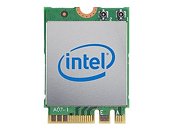Sunday, January 27th 2019

Intel Readies "Cyclone Peak" Wireless-AX 22260 WLAN Cards
Intel is giving finishing touches to its new family of compact WLAN cards for portables and motherboards, under the "Cyclone Peak" family. These include the Wireless-AX 22260 sold under Intel's main brand, and two re-branded or differentiated products by RivetNetworks: Killer Wireless-AX 1650x (22260NGW), and Killer Wireless-AX 1650W (22260D2W). Device IDs for these cards were recently added to the IWLWIFI repository by Intel software teams. "Cyclone Peak" offers 802.11ax Wi-Fi connectivity, in addition to Bluetooth 5. 802.11ax provides about 37 percent higher data-rate than 802.11ac, but improved effective bandwidth due to better spectrum utilization.
Source:
Phoronix

15 Comments on Intel Readies "Cyclone Peak" Wireless-AX 22260 WLAN Cards
Obviously if this ends up in a new notebook, it's not going to be a bad thing, but don't waste money on the first generation routers, as there seems to be a lot of things that aren't finished yet and it's unclear if those features will be added via firmware/software updates or not.
Much as with 802.11ac, a lot of key features seems to be missing from the early routers and the same most likely applies to client devices too.
But someone has to be first I guess...
That said, 802.11ax does look like an actual improvement, even for 2.4GHz, but it will require all client devices to be 802.11ax to make a significant difference.
Intel's LTE modems are to be avoided, but that doesn't have much bearing against their 5G modems, which have not even been released yet (like 5G itself, cellular 5G in particular).
Hell, I have an ivy bridge era laptop and wifi will drop and refuse to reconnect on enterprise APs until reboot.
It will not work as your brand of laptop Does not whitelist its use
Intel also doesn't allow you to use their chipsets as a Wi-Fi AP/bridge in notebooks (as a bridge, where the Ethernet port is connected to the internet), which is annoying and there's really no reason why they're doing this.